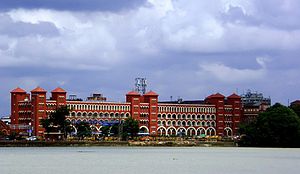Howrah railway station
|
Howrah
হাওড়া |
||||||||||||||||
|---|---|---|---|---|---|---|---|---|---|---|---|---|---|---|---|---|
| Regional rail, Commuter rail, Light rail & Rapid transit station | ||||||||||||||||

Howrah Station, view from Hooghly River
|
||||||||||||||||
| Location | Lower Foreshore rd, Howrah - 711101 Howrah district, West Bengal India |
|||||||||||||||
| Coordinates | 22°34′54″N 88°20′32″E / 22.5818°N 88.3423°ECoordinates: 22°34′54″N 88°20′32″E / 22.5818°N 88.3423°E | |||||||||||||||
| Elevation | 12 metres (39 ft) | |||||||||||||||
| Owned by | Indian Railways | |||||||||||||||
| Operated by | Eastern Railway and South Eastern Railway Zone | |||||||||||||||
| Line(s) |
Howrah-Delhi main line Howrah-Nagpur-Mumbai line Howrah-Chennai main line Howrah-Allahabad-Mumbai line |
|||||||||||||||
| Platforms | 23 | |||||||||||||||
| Tracks | 26 | |||||||||||||||
| Connections |
|
|||||||||||||||
| Construction | ||||||||||||||||
| Structure type | Standard (on ground station) | |||||||||||||||
| Parking | Available | |||||||||||||||
| Other information | ||||||||||||||||
| Status | Functioning | |||||||||||||||
| Station code | HWH | |||||||||||||||
| Division(s) | Howrah(ER) | |||||||||||||||
| History | ||||||||||||||||
| Opened | 1854 | |||||||||||||||
| Electrified | 1954 | |||||||||||||||
| Previous names | East Indian Railway Company | |||||||||||||||
| Services | ||||||||||||||||
|
||||||||||||||||
Howrah Junction railway station (station code HWH) is the largest railway complex in India with maximum number of platforms in the entire railway system of India, 23 platforms. It is one of the four intercity railway stations serving the city of Kolkata, the others being Sealdah Station, Santragachhi Station and Kolkata railway station. The terminal station is located on the west bank of the Hooghly River, linked to Kolkata by Howrah Bridge. With 23 platforms, it has the highest train-handling capacity of any railway station in India; and is top ranked first busiest railway stations in terms of passenger volume per day.
Total 293 passenger trains Start/End/PassThrough Howrah railway station. Total 1220 Stations are directly connected to Howrah railway station via these 293 passenger trains.
Initial plans for the first Howrah railway station were submitted by George Turnbull the Chief Engineer of the East Indian Railway Company on 17 June 1851. In January 1852, it became clear that the government authorities would not sanction the purchase of sufficient land nor the necessary waterfrontage despite remonstrations from Turnbull that the terminus would grow enormously. In May 1852, the detailed station plans were the major work of him and his team of engineers. In October four tenders for building the station were received varying from 190,000 to 274,526 INR against an estimate of 250,000 INR.
Due to a great increase of traffic, a new station building was proposed in 1901. The new station was designed by the British architect Halsey Ricardo. It was brought into service on 1 December 1905. This building is the current Howrah station building. The station had 15 platform tracks.
It was expanded in the 1980s with the addition of 8 platform tracks in an area to the south of the station which previously had a parcels terminal, bringing the track count up to 23. At the same time a new Yatri Niwas (transit passenger facility) was built south of the original head house.
...
Wikipedia
